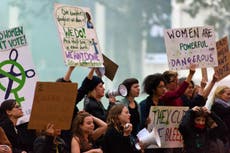Forcing women into debt is a marker of domestic abuse
Finally, the Domestic Abuse Bill recognises economic abuse. But the financial services sector and law can go further in breaking this catastrophic cycle of control
Your support helps us to tell the story
From reproductive rights to climate change to Big Tech, The Independent is on the ground when the story is developing. Whether it's investigating the financials of Elon Musk's pro-Trump PAC or producing our latest documentary, 'The A Word', which shines a light on the American women fighting for reproductive rights, we know how important it is to parse out the facts from the messaging.
At such a critical moment in US history, we need reporters on the ground. Your donation allows us to keep sending journalists to speak to both sides of the story.
The Independent is trusted by Americans across the entire political spectrum. And unlike many other quality news outlets, we choose not to lock Americans out of our reporting and analysis with paywalls. We believe quality journalism should be available to everyone, paid for by those who can afford it.
Your support makes all the difference.Despite a growing understanding that domestic abuse is about coercive and controlling behaviour in recent years, we are still missing a crucial piece of the puzzle; an understanding of how economic abuse threads through and reinforces this behaviour.
Recognised in the Domestic Abuse Bill for the first time, economic abuse is a form of control that restricts, exploits and sabotages a victim's economic well-being – from what money they can access, to how much food they have in the fridge or what toiletries they are “allowed” to buy. It is a destabilising and devastating form of coercive control.
A particularly common tactic by perpetrators is to force victims into debt – an effective and lasting trap that drains what money a victim does have available, reducing their space to act and often leading to them being on the breadline.
Over the years, I have met many women who have been forced – through fear of negative repercussions (including physical and sexual violence) – to take out loans, mortgages, credit cards, and other credit agreements and who have then been left to pay them off, and built up further fines for late or missed payments, sometimes even facing homelessness. I have met women whose partners have run up huge utility bills in their name, resulting in those utilities being cut off and leaving them and their children living in unspeakable hardship.
Coerced debt is a particularly effective type of abuse because it is so very hard to escape from. Coerced debt can shackle victims for decades – every payment a constant reminder of the abuse they endured. Meanwhile, abusers profit from the debt - maintaining comfortable lifestyles, taking nice holidays and living a debt-free life.
This has to stop.
Over the last three years, Surviving Economic Abuse carried out our most ambitious research project to date, the Economic Justice Project – a first of its kind study in England and Wales. The findings made plain what we had long suspected: coerced debt is the invisible marker of domestic abuse.
Sixty per cent of domestic abuse victims had been forced into debt and the average amount of debt was £4,500 to an average of five creditors. One victim-survivor owed £40,000 to 27 creditors. We also discovered that 44 per cent of these debts are priority debts, which means victims are facing the harshest punishment including utility bills being cut off, bailiffs coming round, courts summons, or even homelessness.
Along with our partners at Money Advice Plus, we have helped write off some coerced debt on behalf of victim-survivors. But only 1 in 4 write off requests are met, and the response across the industry is patchy and ad hoc.
Lenders must recognise that coerced debt is real and it is happening. One way forward is to ask institutions to accept an Economic Abuse Evidence Form. This form will ensure questions about coercive and controlling behaviour are routinely asked by money/debt advisors and can help validate the victim’s allegations.
We also need to see consumer law reformed in order to protect those victims and to hold perpetrators accountable. At the moment, too many victim-survivors are left paying off crippling debt that simply isn’t theirs to pay, debt that has left them with mental health issues, sleepless nights and years of living on a knife's edge. We urgently need a uniformed response across the financial services sector that will recognise and support victims – not further punish them for the crimes of their abusive partner or ex-partner.
It is critical to remember that this abuse often takes place long after a victim has left the perpetrator. This is why we've tabled an amendment to the Domestic Abuse Bill, as it currently goes through the House of Lords, asking to criminalise post-separation abuse. As it stands, if your abusive ex-partner had coerced you into tens of thousands of pounds of debt, and you’re no longer living together, the criminal law won’t help you either. How can that be fair?
As a society, we are still lacking a widespread awareness of how economic abuse controls women’s economic wellbeing, their safety, their entire lives. But if we don’t fully understand how domestic abuse operates in all its guises, how can we expect to fully support victims and work towards preventing abusers? Right now, far too many are being saddled with debt that isn’t theirs to pay, and left behind by the institutions that are meant to help and project them. It’s time we all wake up to economic abuse.
Dr Nicola Sharp-Jeffs is the founder and CEO of Surviving Economic Abuse. For more information on the Economic Justice Project and coerced debt visit Surviving Economic Abuse.




Join our commenting forum
Join thought-provoking conversations, follow other Independent readers and see their replies
Comments